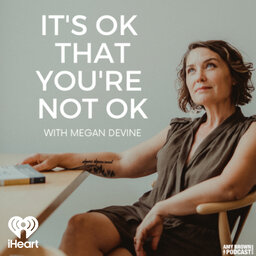Steven Kotler: Peak Performance and Getting Older (for humans and for dogs!)
When life feels hard, does “peak performance” mean anything?
Steven Kotler is known as the NYT best selling author of books like Stealing Fire and The Rise of Superman, but can the science of stretching limits apply to grief of any kind? If you look beyond the slick language of bio-hacking and extreme sports typically found in discussions on peak performance, it turns out there’s something here for all of us.
In this episode we cover:
- How peak performance applies to your life - even if you’re not an athlete
- Why gratitude tends to work better than affirmations
- The scientific reason why play is good for you - and important for healthy aging
- The first three days of grief: what loss is like inside a hospice-based dog rescue
- How a change in mindset can extend your life by eight years (but that’s not the same as toxic positivity)
Related episodes:
What’s It All For? Loss and Meaning in Midlife with Chip Conley
Pet Loss and Veterinarians Who Cry: with Veterinary Oncologist and Author Dr. Renee Alsarraf
Connection is the Best Medicine: with Dr. Rana Adwish
Notable quotes:
“Limits are liberating.” – Steven Kotler
“Hope is about the collaborative effort.” – Steven Kotler
About our guest:
Steven Kotler is one of the world’s most renowned experts on human performance. His NYT best selling books include The Art of Impossible and The Rise of Superman. He’s the co-founder of Planet Home and the Executive Director of the Flow Research Collective. Steven’s work has been nominated for two Pulitzer Prizes, and appears in over 100 publications, including the Wall Street Journal, TIME, and the Harvard Business Review. His latest book, Gnar Country: Growing Old, Staying Rad, details the application of peak performance tenets on an aging body. Find him at stevenkotler.com
About Megan:
Psychotherapist and bestselling author Megan Devine is recognized as one of today’s most insightful and original voices on grief, from life-altering losses to the everyday grief that we don’t call grief. She helms a consulting practice in Los Angeles and serves as an organizational consultant for the healthcare and human resources industries.
The best-selling book on grief in over a decade, Megan’s It’s Ok that You’re Not OK, is a global phenomenon that has been translated into more than 25 languages. Her celebrated animations and explainers have garnered over 75 million views and are used in training programs around the world.
Additional resources:
The Art of Impossible: a Peak Performance Primer
The Future Is Faster Than You Think by Peter H. Diamandis and Steven Kotler
The Rise of Superman: Decoding the Science of Ultimate Human Performance
A Small Furry Prayer: Dog Rescue and the Meaning of Life
Rancho de Chihuahua - Joy and Steven’s non-profit dog sanctuary
Want to become a more grief-informed, human-centered therapist or provider? Registration is open now for Megan Devine’s 6 month online Grief Care Professional Certificate Program. Details at this link.
Want to talk with Megan directly? Join our patreon community for an inexpensive monthly open video Q&A clinic for grieving people. Want to speak to her privately? Apply for a 1:1 grief consultation here.
Check out Megan’s best-selling books - It’s OK That You're Not OK and How to Carry What Can’t Be Fixed
Books and resources may contain affiliate links.
Get in touch:
Thanks for listening to this week’s episode of It’s OK that You’re Not OK. Tune in, subscribe, leave a review, tag us on social with your thoughts, and share the show with everyone you know. Together, we can make things better, even when they can’t be made right.
Follow the show on TikTok @itsokpod and use the hashtag #ItsOkPod on all social platforms
For grief support & education, follow us at @refugeingrief on Instagram, Facebook, Twitter, and TikTok, and follow Megan on LinkedIn
For more information, including clinical training and consulting and to share your thoughts, visit us at megandevine.co
In 1 playlist(s)
It’s OK That You’re Not OK with Megan Devine
Life is full of difficult things, from tiny everyday disappointments to life-altering events. Everyo…Social links
Follow podcast
Recent clips

Protecting Your Mental Health in the Healthcare Workplace, with the Burned Out Burnout Expert, Dr. Jessi Gold
37:29

Over and Over Again: Illustrator Aubrey Hirsch on the Power of Storytelling
39:19

Untangled: Suffering & The 8-Fold Path with Koshin Paley Ellison
1:02:51
 It’s OK That You’re Not OK with Megan Devine
It’s OK That You’re Not OK with Megan Devine